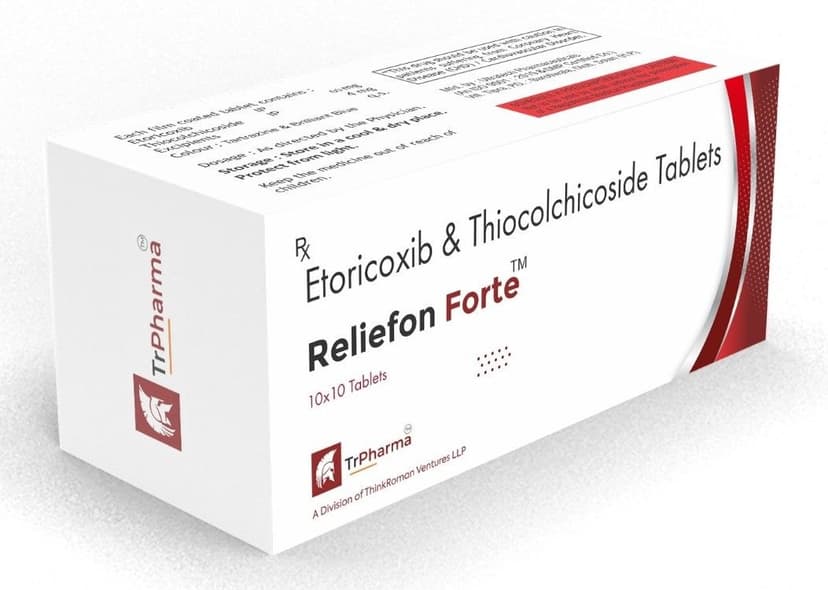
Reliefon Forte
Dual-action formula for lasting relief and muscle relaxation.
₹224
₹190
Targets and swiftly reduces pain and inflammation. Acts rapidly to provide relief and improve mobility. Acts as a muscle relaxant, effectively reducing spasms and discomfort. Enhances the therapeutic effects by easing muscle tension.
Generic Names:
• Etoricoxib (dose may vary), Thiocolchicoside (dose may vary)
Brand Name:
• Reliefon Forte (by TrPharma, a division of ThinkRoman Ventures LLP)
Pharmacologic Class:
• Nonsteroidal Anti-Inflammatory Drug (NSAID)
• Muscle Relaxant
Therapeutic Use:
• Pain Relief and Inflammation Reduction: Provides relief from acute and chronic pain associated with musculoskeletal conditions, including osteoarthritis, rheumatoid arthritis, and ankylosing spondylitis.
• Muscle Relaxation: Reduces muscle spasms and stiffness in conditions such as low back pain or other muscle-related issues.
Mechanism of Action:
• Etoricoxib: A selective COX-2 inhibitor that reduces the production of prostaglandins, thereby alleviating pain and inflammation.
• Thiocolchicoside: A muscle relaxant that acts on the central nervous system by modulating neurotransmitter activity, reducing muscle spasms and promoting relaxation.
Dosage Forms:
• Tablets: Typically available in blister or Alu-Alu packaging, with 10x10 tablet packs.
Indications:
• Musculoskeletal Pain: Conditions like back pain, neck pain, and sprains.
• Arthritis-Related Pain: Used to treat osteoarthritis, rheumatoid arthritis, and other inflammatory joint conditions.
• Post-Surgical or Injury-Related Muscle Pain: Helps reduce muscle spasms and discomfort.
Contraindications:
• Known hypersensitivity to etoricoxib, thiocolchicoside, or other NSAIDs.
• Severe Liver or Kidney Impairment: Use with caution or avoid due to potential adverse effects.
• Active Gastrointestinal Bleeding or Ulcers: As etoricoxib can aggravate these conditions.
Adverse Effects:
• Common: Stomach discomfort, nausea, headache, dizziness, or drowsiness.
• Serious: Risk of cardiovascular events (heart attack, stroke), gastrointestinal bleeding, or liver dysfunction.
• Rare: Severe skin reactions, hypersensitivity reactions, or myopathy.
Drug Interactions:
• Anticoagulants (e.g., warfarin): May increase bleeding risk.
• Other NSAIDs or Steroids: Can increase the risk of gastrointestinal side effects.
• Diuretics and Antihypertensive Drugs: NSAIDs can reduce their effectiveness.
Special Precautions:
• Cardiovascular Risk: Use with caution in patients with a history of heart disease or stroke.
• Renal and Hepatic Function Monitoring: Necessary for long-term users or those with preexisting conditions.
• Avoid Driving or Operating Machinery: Due to possible dizziness or drowsiness.
Pregnancy and Breastfeeding:
• Pregnancy: Not recommended, especially in the third trimester.
• Breastfeeding: Safety data is limited; consult a healthcare provider.
Pediatric Use:
• Not recommended for children unless specifically prescribed by a physician.
Dosage:
• Adults: Dosage as directed by a healthcare professional, typically once or twice daily based on the severity of symptoms.
Storage:
• Keep in a cool, dry place, away from direct light and moisture.
• Store out of reach of children.
Missed Dose:
• Take as soon as remembered, unless it is close to the next dose. Do not double up doses.
Overdose Management:
• Symptoms may include severe abdominal pain, vomiting, or signs of liver or kidney damage.
• Seek immediate medical help if an overdose is suspected.
Expert Advice:
• Take with or after food to minimize gastrointestinal discomfort.
• Do not combine with other NSAIDs unless advised by a healthcare professional.
• Report any unusual symptoms, such as swelling, chest pain, or severe abdominal pain.
Frequently Asked Questions:
• What should I do if I experience side effects?
Discontinue use and consult your healthcare provider immediately if symptoms are severe.
• Can Reliefon Forte be taken long-term?
Long-term use should be avoided due to potential risks; follow your doctor’s advice.
• Is alcohol safe while taking this medication?
Avoid alcohol as it may increase the risk of gastrointestinal bleeding.